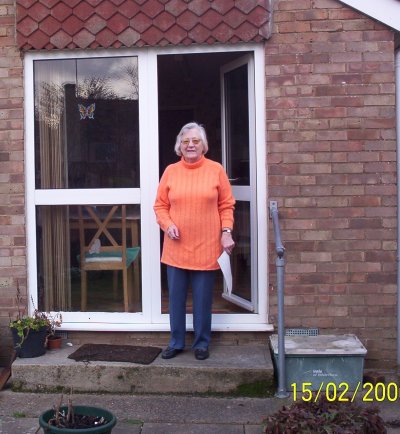
Dorothy (Dot) Hewlett was born in 1931 in Todmorden in west Yorkshire [the historic boundary between Yorkshire and Lancashire runs through the town]. Her father worked in the cotton industry as a textile design teacher but, when the depression of 1932 affected the industry, he made the decision to move to Southport on the coast in Lancashire where he bought a dairy. Dot already had three aunts living in Southport, so it seemed a sensible move. Both grandfathers, who had been ‘tatters’ [overseers in the cotton industry] moved to Southport when they retired.
Dot’s father kept the dairy until the war broke out when legislation meant that milk deliveries became zoned. As his previous customers in the hospitality business had been affected by a drop in demand at the start of the war and petrol was rationed for delivering further afield, the business was no longer viable and so he changed occupation. He went into the Civil Service and joined the National Assistance Board (NAB) whose headquarters had been evacuated to Southport. He used his motorbike to visit elderly people to see whether they qualified for any benefits. When the war was over his department moved back to London and the NAB helped Dot’s family to buy a house in Surrey.
Dot’s mother worked in the shop attached to the dairy, which also sold fish and greengroceries. When rationing started, she stopped selling rationed goods and after a while decided to close the shop completely. She had taught shorthand before the war and so found work as a secretary to the principal of a further education college. Two aunts who had boarding houses in Southport didn’t want to take in evacuees so they, with their young children, went to live with Dot’s family. The shop premises came in useful, as the aunts were able to store their furniture there.
The first memory of the war that Dot had was the day before war broke out. She was pushing the little boy from next door in his pram to the school railings where she saw many evacuee children standing there. They had come from Bootle, a deprived area of Liverpool, and brought with them nits, head lice and scabies, etc.
One day at school the children were timed running back to their own home and then back to school. If they could run quickly enough, they were allowed to shelter at home during an air raid; if not, they had to use the school shelter – which they enjoyed playing in. But school wasn’t disrupted very much as the raids were mostly at night. If the siren went off during the night, Dot’s mother would push her under the table but it didn’t take long to realise that the raids were mainly further away from their house and so they just slept through them. The only time they did have any bombs was when German planes had been chased out of Manchester towards the sea and dropped their bombs randomly before returning to Germany. One bomb blew out the windows of houses in the road near where one was dropped, while another just missed a munitions factory nearby which no-one had realised was there.
There were a lot of sirens every time Liverpool and Manchester got a raid. Dot’s father had joined the Auxiliary Fire Service (AFS) and was a volunteer station officer. Every time there was a siren her father, as station officer, had to go to the fire station. The firemen were all volunteers. On occasions he had to go to Liverpool or Manchester as back-up. He told Dot that once it was so cold the water coming out of the hoses was freezing and the men were slipping and sliding all over the place. Dot remembers him wearing his uniform helmet and tunic, with a big axe on his belt.
She also remembers going to the cinema quite often during the war and she also very much enjoyed being a Girl Guide [an interest that continues to this day]. She said that they had to camouflage all the Guides’ tents so that, when they pitched them, they would be not seen from the air. However, they had a bright yellow one whose colour they couldn’t bear to change so that had to be camouflaged under the trees. On another occasion during a visit to the Lake District, the Guides heard that the atom bomb had been dropped in Japan and that was the end of the war.
Interviewed by Tony Rogerson on 13 February 2006